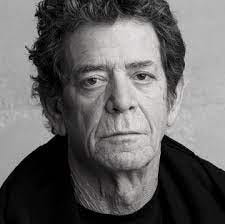It is best when you don’t know you’re making your last great album. If the end is obviously nigh, then there might not be any way around it. But you’re Lou Reed and it’s 2000, and you’ve been around so long, you survived the generation that was really influenced by you. Now it’s all Oasis or Madonna or The Spice Girls. This new century is going to be rough, and you have been a real prick, and this is your muse, and how you found yourself singing a song of yourself in those deep, dulcet tones.
They call you ecstasy
Nothing ever sticks to you
Not velcro, not scotch tape
Not my arms dipped in glue
Not if I wrap myself in nylon
A piece of duct tape down my back
Love pierced the arrow with the twelve
And I can't get you back
If you were a pure machine of dark, fucked up art, it would be a straight line. But it’s not. Because people were harmed in the making of this album, and one of them is Laurie Anderson, the love of your life, and your mistreatment of her is the album, and this is the last really good thing you ever do. Lou, you make it to 71, and your last album was a collaboration with Metallica. I can’t even get into it, but in the future, it is easy to have every album, even the ones you don’t want. You could listen to it without looking for it, but I really don’t want to bum you out. This song, “Ecstasy,” is dark and brooding and sexy. Don Alias plays a beautiful percussion part. Joni Mitchell really loved him. He also beat her up. A few times.
These men and the damage they do and the art they make. This is a much better album than Set the Twilight Reeling. That’s how it goes. That album was a love letter to Laurie. This one is poison. They held it together. They got married, and he died in her arms five years later. She embraced him and all his contradictions. She had perspective. She still does.
Across the streets an old Ford, they took off its wheels
The engine is gone
In its seat sits a box
With a note that says, Goodbye Charlie, thanks a lot
I see a child through a window with a bib
And I think of us and what we almost did
The Hudson rocketing with light
The ships pass the Statue of Liberty at night
Lou doesn’t want a kid. He wrote a song about it. He thought about it. But he doesn’t. Lou doesn’t want to behave. Lou doesn’t want to be told what to do. But then he has to face himself and he has to be honest. This is his unflinching principle. You can beat me all you want, but I don’t love you anymore. If he was just a sociopath, you wouldn’t have these songs. He feels bad and puts it in a song. There will not be a Netflix series about his killing spree. But he does damage. He acts like he doesn’t care, but he does.
I interviewed Lou in 2006. It was six years past Ecstasy and seven years before the end. His contempt for the process was so epic, it wasn’t personal. YouTube was new and hadn’t catalogued his abuse of journalists. If you like Lou, it’s entertaining. If you like Lou but weren’t prepared, you had to buckle up.
Ecstasy—it’s not just pure pleasure. It’s not pure euphoria. If it’s shared with another person, all kind of things can go wrong. And if you’re Lou, it hurts. It cuts. It hurts you, it hurts Laurie, and it is your muse.
A big stud through my eyebrow
A scar on my arm that says, Domain
I put it over the tattoo
That contained your name
Tatts got more popular after Lou left us, but they weren’t tatts like these. Lou has a phantom thread tattoo. Layers of ink, of pain, of pleasure, of a hidden name, of getting all messed up with both. Lou sang of kissing the whip of shiny, shiny leather on the first Velvet Underground album. He let us know exactly who he was.
“Such a perfect day,” he sang. “I thought I was someone else, someone good.” Can we, like the junkie in the song, ever take a vacation from ourselves. People with bad reputations do good stuff that we don’t know about. Personality, said F. Scott Fitzgerald, is an unbroken series of successful gestures. Lou left the impression he wanted to leave. Laurie Anderson knew that he was a dancer, that he could take a watch apart and put it back together, that he was a devoted tai chi student. At the end of “Perfect Day,” Lou knows there is no escape. “You’re going to reap what you sow,” he sang. Death by liver disease at 71 is not a great way to go out. They’re still putting out his demos, and each of them is fascinating. I’ll never quit Lou Reed. I wish I could say, “You don’t know him like I do,” but I don’t, except when I turn up the volume. Listen to Ecstasy. It sounds so good, it hurts.





